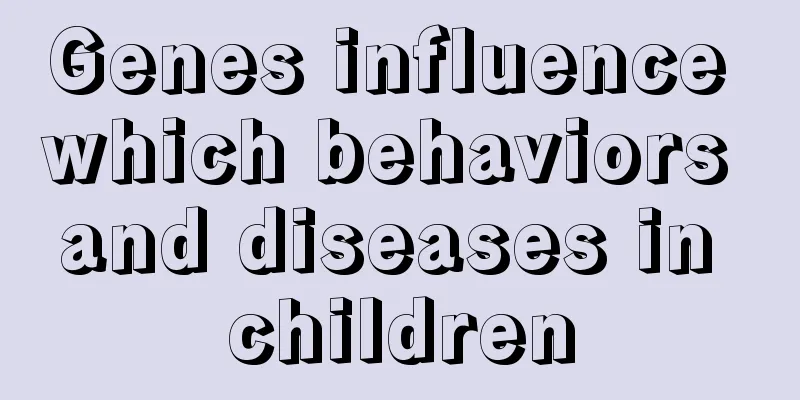Does eating sweets during breastfeeding affect the baby? Will eating sweets during breastfeeding make breast milk sweeter?

|
Does eating sweets during breastfeeding affect the baby? Can breastfeeding mothers eat sweets during breastfeeding? There was a rumor that eating sweets during breastfeeding will affect the baby's height and intellectual development. Is this true? Let's tell you whether eating sweets during breastfeeding will make breast milk sweeter. Does eating sweets during breastfeeding have any effect on the baby?You can’t eat too much sweets during breastfeeding, but you can eat less biscuits. If the mother takes in too much sugar, the baby’s stool will have bubbles, which is not good for the baby and the mother. First, the mother will easily gain weight, and secondly, the baby will prefer sweets in the future, which is not good for the teeth. Breastfeeding mothers cannot eat anything they want. The baby's gastrointestinal function is not yet fully developed, and the digestion and absorption ability is relatively weak, so the baby basically will not process the food he eats. What you have eaten can be reflected from the baby's stool. For example, if you eat more cucumbers, the baby's stool will be green. If you eat too much watermelon or eat cold food, the baby will have diarrhea. If you eat spicy food, the baby will be constipated and get angry. So for the sake of the baby, you must pay attention, eat more light food, drink more soup, and ensure that the baby has enough food. Babies who are fed with breast milk are happy babies. Dietary considerations during breastfeedingBreastfeeding mothers should have the following nutrients: 1 kg of milk per day. It can be fresh milk, low-fat milk, fat-free milk, condensed milk or milk powder, divided into 6 drinks. In order to ensure adequate intake of vitamin C, 2 of the fruits and vegetables must be eaten raw, and 2 of the fruits and vegetables should be eaten oranges, grapefruits, tomatoes, raw cabbage or berries. In order to ensure adequate vitamin A, one dark green leafy vegetable or light yellow leafy vegetable should be eaten. Meat, poultry, fish at least one meal a day, larger quantities, preferably two meals. Animal liver has a particularly high nutritional value and should be eaten occasionally. One egg per day. Cereals and bread 3 times a day, pure cereals containing various vitamins B should be eaten. Vitamin D preparations should also be supplemented to ensure the absorption of calcium in the diet. If a breastfeeding mother gains too much weight, she can drink some low-fat or skim milk, eat less butter, eat less cereal and bread (but can eat some pure cereal foods to take in various vitamins B), and avoid high-calorie foods such as candy, cookies, cakes, pastries, and soda. However, the intake of milk, vegetables, fruits, meat and vitamin D should not be reduced. Therefore, eating candy is not good. What to eat during breastfeeding1. Sufficient water intake: Mothers should drink plenty of water and eat more liquid foods such as soup and various porridges every day to replenish the water lost in breast milk and ensure the quality of breast milk. Chicken, duck, fish, broth or beans and their products and vegetable soup can make mothers' milk more abundant, and the amount of soup can be adjusted according to the amount of breast milk. 2. Ensure the intake of high-quality protein: more than one-third of the protein in daily food should come from animal food. Mothers can try to make pig's trotter soup, which is rich in protein and fat, and has a strong blood-activating and blood-tonifying effect, while Tongcao has the function of promoting water and promoting lactation. 3. Dietary diversification: The food should be as complete as possible, and you should not be picky about food to ensure that you can take in enough nutrients. The staple food should be a combination of coarse and fine, and the side dishes should be as diversified as possible. 4. Some foods should not be eaten too much: eat less salt and pickled foods, irritating foods, and polluted foods. Smoking, drinking, drinking coffee, or taking certain drugs for a long time will affect the baby's health through breast milk. Avoid eating foods that inhibit breast milk secretion: such as malt water, ginseng, leeks, etc. 5. The daily dietary composition of the mother: 400-500 grams of rice and noodles; 100 grams of beans and bean products; 100 grams of eggs (2-3); 500-750 grams of vegetables and fruits; 250 grams of milk; 150-200 grams of animal food (meat, poultry, fish, etc.); 50-100 grams of animal offal (per week). |
<<: Can pregnant women breastfeed when they have a cold? It depends on the specific situation.
Recommend
Recommended by mothers: Japanese Nepia diapers keep babies dry and sleep all night
Diapers are essential for babies, but newborn bab...
What are the reasons for baby spitting up milk? How to deal with baby spitting up milk
I just finished feeding my baby, and not long aft...
What brand is Penaten? Which country is Penaten from?
What is Penaten? Penaten is a baby care brand fro...
How to effectively increase milk production? Breastfeeding is the key
Mothers with insufficient milk always try to find...
When should I start using a birthing ball? What are the functions of a birthing ball?
In order to relieve the pain of parturients, more...
Is it necessary to shave your pubic hair before giving birth? Why do you need to shave your pubic hair before giving birth?
Many pregnant women are hospitalized before givin...
Can I fly when I am pregnant? Does it affect flying when I am pregnant?
Usually, mothers need to rest after pregnancy, an...
Can pregnant women eat oil oranges? How to eat oil oranges
The oil orange is a green fruit. Although it can ...
Can babies eat candy during their teething period? Can children eat candy during their teething period?
The replacement of teeth is an inevitable process...
What is the impact of ADHD on children in adulthood? What is the impact of ADHD on children?
Many parents know that ADHD in children has a ver...
What should I do if my baby is breathing rapidly?
Does your baby sometimes breathe fast and grunt? ...
How long does it take for the milk to stop flowing after a normal birth without breastfeeding?
For most mothers, they will breastfeed their babi...
Does WiFi have any effect on babies? Does WiFi have any effect on newborns?
Does WiFi have any effect on babies? This is a co...
When is the best time to take Calcium? Can I take Calcium if I have high blood pressure?
Many people need calcium supplements because of l...
How long after brushing your teeth can you use mouthwash? How long after using mouthwash can you drink water?
Mouthwash has a long shelf life, but once opened,...









